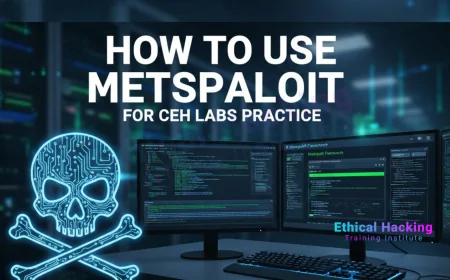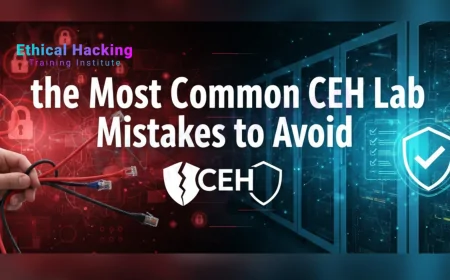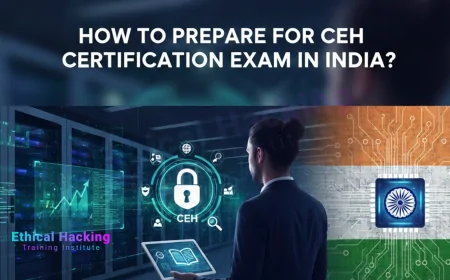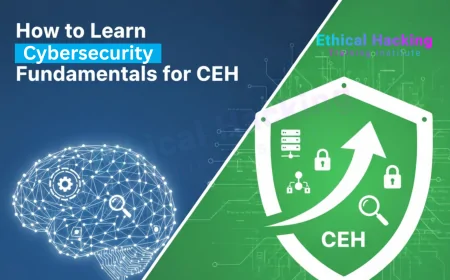CHFI Cert: Why This Certification Is Crucial for Your Career in Cybersecurity | Cybersecurity Career Growth Starts with CHFI Certification
Discover why the CHFI certification is essential for a cybersecurity career. Learn about its benefits, exam details, course structure, job roles, salaries, and how to become a Certified Hacking Forensic Investigator.
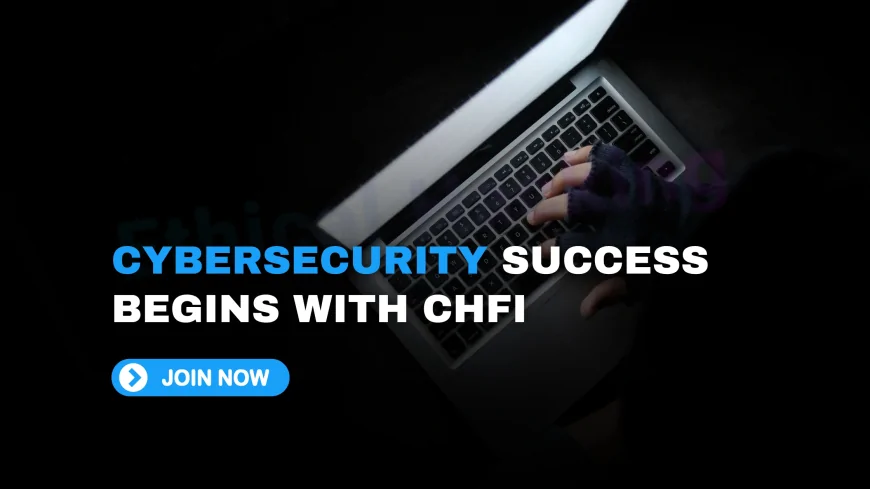
Table of Contents
- Introduction
- What is CHFI?
- Why CHFI Certification is Crucial
- Who Should Pursue CHFI?
- CHFI Course Structure
- CHFI Exam Details
- Key Learning Objectives
- Skills Covered in CHFI
- Job Roles & Career Opportunities
- Salary Scope for CHFI-Certified Professionals
- Top Online CHFI Training Providers
- Benefits of CHFI Certification
- CHFI vs Other Forensic Certifications
- Real-World Applications of CHFI
- Challenges & How to Overcome Them
- Preparation Tips for CHFI
- CHFI Certification Renewal
- Student Success Stories
- FAQs
- Conclusion
Introduction
In today’s digital world, cybersecurity is no longer optional—it is a necessity. With a steep rise in cybercrimes, the demand for skilled digital forensics professionals is growing faster than ever. The Certified Hacking Forensic Investigator (CHFI) certification, offered by EC-Council, equips professionals with the skills to investigate cyberattacks and gather digital evidence lawfully. Whether you're an IT professional, law enforcement agent, or cybersecurity specialist, earning the CHFI cert can be a career-defining decision.
What is CHFI?
CHFI (Certified Hacking Forensic Investigator) is a globally recognized certification provided by EC-Council. It validates a professional’s ability to detect hacking attacks, properly extract evidence, and report on cybercrimes. The certification dives deep into digital forensics tools, techniques, and procedures used in the real world
Why CHFI Certification is Crucial
-
Digital Forensics is Mainstream: Every major organization requires forensic professionals.
-
Legal Compliance: CHFI teaches evidence handling that complies with legal standards.
-
Post-Breach Investigation: Essential for analyzing incidents post-attack.
-
Growing Demand: Digital forensics roles are among the top 10 fastest-growing cybersecurity jobs globally.
Who Should Pursue CHFI?
-
Security Officers
-
Incident Responders
-
Network Admins
-
IT Managers
-
Law Enforcement Personnel
-
Legal Professionals handling cybercrime
CHFI Course Structure
The CHFI v10 syllabus includes 14 core modules:
-
Computer Forensics in Today’s World
-
Investigation Process
-
Understanding Hard Disks and File Systems
-
Data Acquisition and Duplication
-
Defeating Anti-Forensics Techniques
-
Operating System Forensics
-
Network Forensics
-
Web Application Forensics
-
Database Forensics
-
Cloud Forensics
-
Malware Forensics
-
Email Crime Investigation
-
Mobile Forensics
-
Investigative Reports and Legal Compliance
CHFI Exam Details
| Exam Detail | Information |
|---|---|
| Exam Code | 312-49 (ANSI) |
| Duration | 4 Hours |
| Questions | 150 |
| Format | Multiple Choice |
| Passing Score | 70% (approx.) |
| Delivery | Pearson VUE or online proctored |
Key Learning Objectives
-
Understanding the principles of digital forensics
-
Acquiring and preserving digital evidence
-
Performing in-depth disk, memory, and log analysis
-
Detecting steganography and data-hiding techniques
-
Recovering deleted files and partition data
-
Writing legally admissible investigation reports
Skills Covered in CHFI
-
Cybercrime Investigation
-
Evidence Acquisition and Preservation
-
Log Analysis
-
Incident Response
-
File and Operating System Analysis
-
Anti-Forensics Detection
-
Network & Email Forensics
-
Cloud and IoT Forensics
Job Roles & Career Opportunities
| Role | Description |
|---|---|
| Digital Forensics Analyst | Investigate cyber incidents and gather evidence. |
| Security Consultant | Provide incident response and legal compliance services. |
| Cybercrime Investigator | Work with law enforcement to solve digital crimes. |
| Incident Responder | Analyze security events and apply mitigation. |
| Forensics Auditor | Investigate financial and digital fraud. |
Salary Scope for CHFI-Certified Professionals
| Region | Average Salary |
|---|---|
| USA | $85,000 – $130,000/year |
| UK | £45,000 – £80,000/year |
| India | ₹7 – ₹20 Lakhs/year |
Salaries vary by experience, role, and location.
Top Online CHFI Training Providers
-
EC-Council iClass
-
Simplilearn
-
Infosec Institute
-
Cybrary
-
Koenig Solutions
-
NetCom Learning
Most platforms offer live sessions, hands-on labs, and exam vouchers.
Benefits of CHFI Certification
-
Recognized by government, military, and corporations
-
Enhances legal knowledge in cybersecurity
-
Opens doors to specialized forensic careers
-
Helps in complying with regulatory frameworks (GDPR, HIPAA, PCI-DSS)
CHFI vs Other Forensic Certifications
| Certification | Focus | Difficulty | Recognition |
|---|---|---|---|
| CHFI | Comprehensive digital forensics | Medium | High |
| GCFA | Advanced Incident Response | High | Very High |
| EnCE | EnCase forensic tool specialization | High | Moderate |
| CCE | Computer crime investigation | Medium | Moderate |
Real-World Applications of CHFI
-
Investigating ransomware attacks
-
Employee data theft analysis
-
Internal compliance checks
-
IP theft cases
-
Legal digital evidence collection
Challenges & How to Overcome Them
-
Challenge: Legal complexity in investigations
Solution: Focus on the module covering laws and regulations. -
Challenge: Technical difficulty with tools
Solution: Practice with lab simulations before attempting the exam.
Preparation Tips for CHFI
-
Study EC-Council official courseware
-
Use forensic tools like Autopsy, EnCase, FTK
-
Practice lab simulations
-
Read cybersecurity and legal case studies
-
Join CHFI forums and communities
CHFI Certification Renewal
-
Valid for 3 years
-
Renew by earning 120 ECE credits
-
Credits gained through training, writing, conferences, or additional certifications
Student Success Stories
“CHFI helped me become a full-time forensics investigator in the financial sector.” — Neha R., Mumbai
“I added CHFI to my CEH and instantly became a top candidate in my job interviews.” — James M., London
Frequently Asked Questions (FAQs)
1. What does CHFI stand for?
CHFI stands for Certified Hacking Forensic Investigator, a certification by EC-Council.
2. Who should take CHFI?
IT professionals, law enforcement officers, forensic investigators, and anyone interested in cybercrime investigation.
3. Is CHFI recognized globally?
Yes, CHFI is recognized worldwide, especially in law enforcement, government, and corporate sectors.
4. How much does CHFI cost?
It typically costs between $800–$1,200 depending on the training provider and exam bundle.
5. What’s the passing score for CHFI?
Around 70% is needed to pass the 150-question CHFI exam.
6. Is CHFI good for beginners?
CHFI is best suited for professionals with basic cybersecurity or networking knowledge.
7. What tools are covered in CHFI?
Tools like FTK, EnCase, Autopsy, Wireshark, and more are covered.
8. How long is the CHFI exam?
The exam duration is 4 hours.
9. Does CHFI cover mobile forensics?
Yes, it includes dedicated modules on mobile and cloud forensics.
10. Are there practical labs in CHFI?
Yes, EC-Council iLabs provides cloud-based forensic practice environments.
11. Is CHFI ANSI accredited?
Yes, CHFI v10 is ANSI 17024 accredited.
12. Can I take CHFI online?
Yes, both the training and exam can be taken online.
13. How do I renew CHFI?
You need 120 ECE credits over 3 years via continuing education.
14. What jobs can CHFI get me?
Digital Forensics Analyst, Incident Responder, Security Auditor, etc.
15. Is there any retake fee?
Yes, retakes usually cost extra if not bundled with your course package.
16. Is CHFI better than CEH?
CHFI focuses on forensics; CEH focuses on hacking. Both are complementary.
17. What experience is required?
At least 1–2 years in cybersecurity or completion of EC-Council training.
18. Are there any legal topics in CHFI?
Yes, CHFI covers cyber laws, digital evidence handling, and reporting.
19. Is CHFI difficult?
Moderately. With hands-on labs and preparation, it's manageable.
20. Where can I register?
Visit EC-Council's official site or partner training providers like Simplilearn, Infosec Institute, or Cybrary.
Conclusion
The CHFI certification is not just another badge on your resume—it is a powerful qualification that can shape your career in cybersecurity. As cybercrimes become more complex, the need for skilled forensic investigators grows stronger. With its comprehensive training, hands-on labs, and industry recognition, CHFI empowers professionals to uncover digital evidence, support legal proceedings, and strengthen global cyber defenses.
Whether you are starting out or already in the cybersecurity field, CHFI is an intelligent next step in your professional journey.
What's Your Reaction?
 Like
0
Like
0
 Dislike
0
Dislike
0
 Love
0
Love
0
 Funny
0
Funny
0
 Angry
0
Angry
0
 Sad
0
Sad
0
 Wow
0
Wow
0






